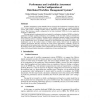Free Online Productivity Tools
i2Speak
i2Symbol
i2OCR
iTex2Img
iWeb2Print
iWeb2Shot
i2Type
iPdf2Split
iPdf2Merge
i2Bopomofo
i2Arabic
i2Style
i2Image
i2PDF
iLatex2Rtf
Sci2ools
124
click to vote
EDBT
2000
ACM
2000
ACM
Performance and Availability Assessment for the Configuration of Distributed Workflow Management Systems
Workflow management systems (WFMSs) that are geared for the orchestration of enterprise-wide or even "virtual-enterprise"-style business processes across multiple organizations are complex distributed systems. They consist of multiple workflow engines, application servers, and ORB-style communication servers. Thus, deriving a suitable configuration of an entire distributed WFMS for a given application workload is a difficult task. This paper presents a mathematically based method for configuring a distributed WFMS such that the application's demands regarding performance and availability can be met while aiming to minimize the total system costs. The major degree of freedom that the configuration method considers is the replication of the underlying software components, workflow engines and application servers of different types as well as the communication server, on multiple computers for load partitioning and enhanced availability. The mathematical core of the method...
Application Servers | Communication Server | Computer Science | Database | EDBT 2000 | Workflow Engines |
Related Content
| Added | 24 Aug 2010 |
| Updated | 24 Aug 2010 |
| Type | Conference |
| Year | 2000 |
| Where | EDBT |
| Authors | Michael Gillmann, Jeanine Weißenfels, Gerhard Weikum, Achim Kraiss |
Comments (0)

